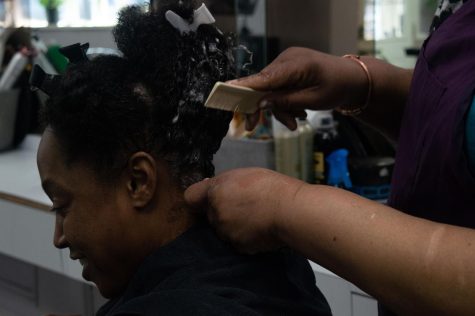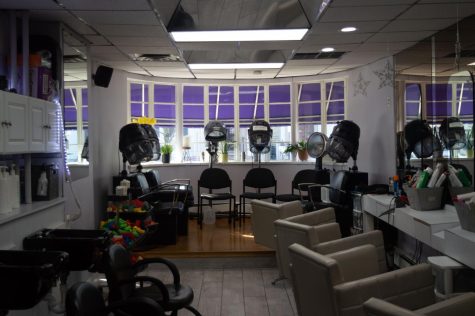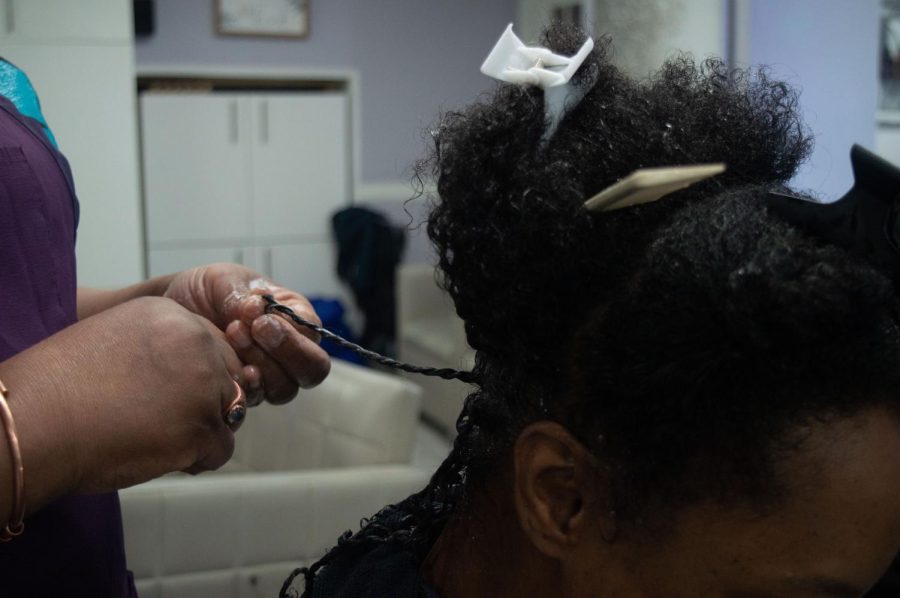Op-ed: You can’t touch my hair
A hairstylist twists a client’s hair at Liz’s Hair Care. Black women have often been compelled to meet Eurocentric beauty standards and struggled to get beauty products that worked with their hair.
February 25, 2023
The transatlantic slave trade did more than just sell people into slavery. By performing a single brutal deed — shaving the hair of African enslaved people — slaves were robbed of their cultural and spiritual importance.
Given the significance of hair in Africa, it was an especially cruel act designed to cut people off from their communities. This began the process of the systemic erasure of culture and identity. We are taught from an early age whether we have “good” or “bad” hair. This occurs both within and outside of the Black community. Black hair is intimate; it is a form of expression and it is beautiful. Our society’s attitude toward Black hair continues to influence how Black individuals are perceived today.
Growing up, I remember having to straighten my hair for important social gatherings such as weddings, first-communions and holiday parties to look more feminine. The western beauty standard of hair is straight and blonde, yet many Black people strongly coil threads to varying degrees. Our society pushes this concept of what hair should look like, and in doing so, erases Black voices and tells people they are not enough. Hair discrimination affects Black women’s self-esteem, the beauty industry, jobs, education and more.
Discrimination based on hair type stems from institutionalized racism. It exists to protect white beauty standards. There are no national legislative protections against hair discrimination; Black individuals are routinely compelled to choose between investing time and money to adapt to Eurocentric ideals of professionalism and beauty or facing repercussions at work or school for having their natural hair.
Natural hairstyles have been prohibited, resulting in the expulsion of Black students from schools and Black workers from workplaces who refuse to conform to traditionally western styles. Michael Trimble is a six-year-old living in Tatum, Texas. His grandmother claims that in 2019, when he was in preschool, the district director gave her the option to either cut off Michael’s ponytail or pin it up. Boys were not permitted to wear their hair in a ponytail, a puff ball or in any other way that extended past their collar, according to the district’s rules. Michael, though, refused to cut it. His grandma claims that when she objected, he was expelled. Hair prejudice affects Black women as early as five years old (as reported by their parents). By the age of 12, 86% of Black youths have experienced hair prejudice.

Hair discrimination has led to the time-consuming procedure of straightening hair. This involves the use of hazardous chemicals, which have a negative impact on the health of black women. Black people, particularly with regard to hairstyles, have had to adopt similar habits to those of white people in order to fit in with society. Conformity means Black moms must straighten their children’s and their own hair in order for white people to see them as peers. According to a 2019 research paper by Tamara Gilkes Borr, Black women who used chemical hair straighteners on a daily basis were roughly 30% more likely to get breast cancer than white women. Regular use of dangerous procedures like relaxers or perms, which are chemical creams or lotions used on natural hair to “relax” the curls and give it a straight appearance, is harmful.
Black women of all statuses are subject to hair prejudice. When recounting their experiences on set, some Black actresses stated how the hairstylists normally hired failed to manage their hair or did a poor job. Yvette Nicole Brown is a well-known actress who was a main ensemble character on the show “Community.” She didn’t have a hairdresser, so she had to come with her hair styled to set. The idea that Black women in the entertainment business must confront such difficulties is concerning. Why should they have to beg for the same fundamental treatment that is provided to their peers? To meet white beauty standards, Black women performers are often compelled to wear wigs made from other types of hair. Hiring diverse talent requires hiring diverse makeup artists and hairstylists. Black women should not have to work twice as hard as white women.

After spending hours visiting the beauty sections of various shops, I saw that the items geared towards Black hair were locked in comparison to the products used for straight hair. Pushing a button, waiting up to 20 minutes for assistance and then having someone arrive with a key to unlock what I need is infuriating, especially when the items are more expensive and scarcer than white hair treatments. According to a poll done by McKinsey & Company, 73% of poll respondents reported that when they attempted to purchase Black cosmetic products, they were usually out of stock. When they were in stock, 54% stated they were difficult to find. Products for Black hair are already rare, and even when they are available, they remain inaccessible for Black individuals. Why should Black women have to beg for shampoo or moisturizer while other people can just walk to the shop and buy their hair products?
So, no. You can’t touch my hair. You can’t wear our braids for fun. You can’t make cornrows become boxer braids. You can’t erase the cultural and historical meaning of Black hair.
Hair discrimination is a result of systemic racism and serves to safeguard white beauty standards. To fight for equality, we must educate ourselves. Students that study social justice, cultural diversity and racial issues are already on a path of inclusivity and respect. In order for every member of our community to feel secure in their identity, we must learn to dismantle our individual prejudices and foster a mutual and beneficial understanding of our differences.
Chanel Lebrun is a second-year communication and media studies combined major. She can be reached at lebrun.cha@northeastern.edu.







